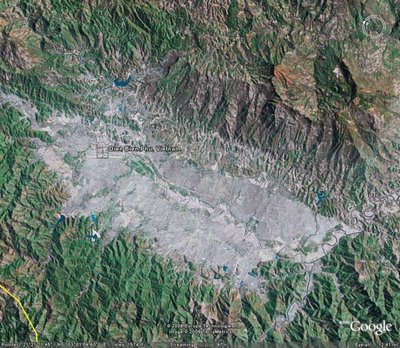
This is the Dien Bien Phu valley in Vietnam. Notice the plain
surrounded by the mountains in full color.

You've probably never seen this before. This is Mang Yang
Pass, near Pleiku, Vietnam
Ok, anyone who's a student of history knows about the Battle of Dien Bien Phu in 1953-54. Briefly, the French High command wanted to draw the Viet Mihn into a climactic battle and picked an isolated valley near Laos to establish a base from which to attack the enemy.
Only problem, they didn't command the heights, and the Viet Minh did. Soon, the post was isolated and under constant fire. It was overrun on May 7th, 1954
But at the same time, in Southern Vietnam, another, equally tragic, but untold battle was taking place. Known to history as Group Mobile 100 or the Battle of Mang Yang pass.
GM 100, made up of veterans of the Korean War, serving with the US Army's 2nd Indianhead Division, and other units, were ordered to retreat from An Khe to Pleiku. To do this, they have to go over mountain passes.
In an era where the units were roadbound and lacked comphensive air support, the battle turned into a bloody fighting retreat. According to Bernard Fall, the unit was decimated in the retreat, 85 percent of the vehicles lost, 100 percent of the artillery. Again and again, VM units attacked the French units, punishing them.
The battle is recreated in the opening of We were soldiers once
If it seems familiar, it should. Unlike in the Second Vietnam War, US units in Iraq are amazingly roadbound and while not facing jungle terrain, would have many of the same problems, long vunerable columns and limited air support to cover any one section at any one time.
Airmobility was invented to end the dependence on roads, until anti-aircraft weapons forced units back down to earth.
While the French didn't have the advantages of the US, many of their tactical problems were similar, in that they had to rely on roads for mobility. When they tried to use paratroopers, they found their utter lack of mobility and the inability to reach then on foot doomed them.
One of the things not widely made public in the US media is that the US Army in Iraq serves in widely scattered units in isolated bases. Even moving to an airfield could lead to a running gun battle to get there.
People are quick to use the history they know. But if America's war in Iraq is like Vietnam, it is closer to the first war, a war of local levies, and professional volunteers than the second. While we may not face a Dien Bien Phu, over the last three years, we have seen our tactical options limited by an ever more aggressive enemy.
As our time in Iraq runs short, it seems that no one has any real idea of how this ends. If it ends like most colonial wars, it will end badly.
No comments:
Post a Comment